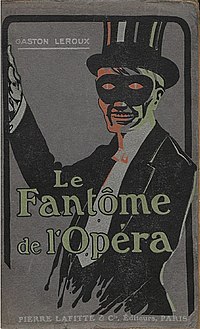Erik (The Phantom of the Opera)
| Erik (The Phantom of the Opera) | |
|---|---|
| The Phantom of the Opera character | |

Illustration of Erik, The Phantom of the Opera, on the cover of Gaston Leroux's 1920 French book edition.
|
|
| First appearance | Le Fantôme De L'Opéra (The Phantom of the Opera) |
| Created by | Gaston Leroux |
| Portrayed by | See "Performers" |
| Information | |
| Aliases | The Phantom of the Opera Opera Ghost The Angel of Music the Red Death The Trapdoor Lover The Man's Voice Le Mort Vivant The Mask |
| Species | Human |
| Gender | Male |
| Occupation |
Maestro impresario architect illusionist ventriloquist contractor |
| Significant other(s) | Christine Daaé |
| Nationality | French |
Erik (also known as The Phantom of the Opera, commonly referred to as The Phantom) is the title character from Gaston Leroux's novel Le Fantôme de l'Opéra (1910), best known to English speakers as The Phantom of the Opera. He is also the protagonist and antagonist of many film adaptations of the novel, including the 1925 film adaptation starring Lon Chaney, Sr., and Andrew Lloyd Webber's musical.
In the original novel, few details are given regarding Erik's past, although there is no shortage of hints and implications throughout the book. Erik himself laments the fact that his mother was horrified by his appearance (causing him to run away from home at a young age), and that his father, a true master mason, never even saw him. The text also reveals that "Erik" was not, in fact, his birth name, but one that was given or found "by accident", as Erik himself says within the work. Leroux sometimes calls him "the man's voice". Erik refers to himself as "The Opera Ghost", "The Angel of Music", and attends a masquerade as the "Red Death" (evidently Erik is familiar with Edgar Allan Poe's short story "The Masque of the Red Death" (1842). Most of the character's history is revealed by a mysterious figure, known through most of the novel as The Persian or the Daroga, who had been a local police chief in Persia, following Erik to Paris; other details are discussed in the novel's epilogue (e.g., his birthplace is given as a small town outside of Rouen, France).
...
Wikipedia
